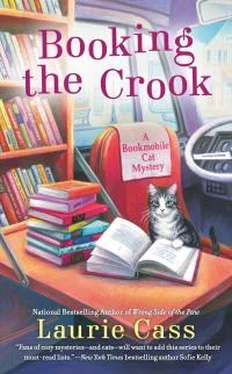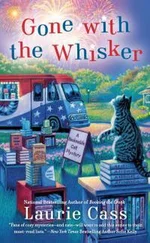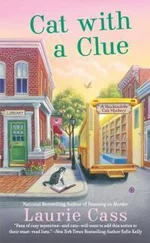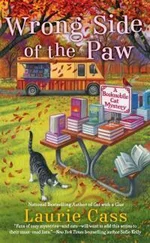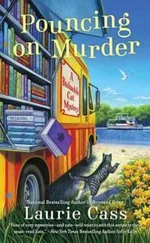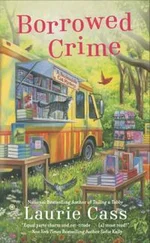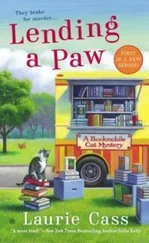“Well,” I said, “hang in there. I’ll try to think of something.”
I finished my coffee and headed back into the weather, not at all sure I’d be able to help Mitchell solve his problem.
• • •
That noon, bowing to the needs of my coworkers—plus their vow that if I went out in the snow to get the food, they wouldn’t ever again complain about having to listen to me review the library safety policies, something we did every other month (not that I believed the vow, but it was nice of them to recognize how much whining they did)—I ventured downtown to the Round Table.
Sabrina was at the register when I came in. “How is it you stay so skinny?” she asked, thumping her hip with an elbow. “Me, I’m squishy and soft and I’m doing my darnedest to lose weight.”
“Sorry,” I said apologetically. “I figure it’ll catch up with me in a few years.”
“Huh.” Sabrina pointed with the top of her head. “How about that one? Is it going to get him, too?”
I turned. Ash had just come inside and was still stomping the snow off his boots. “Depends,” I said. “If he convinces someone to marry him, I bet he puts on thirty pounds the first year. If he stays single?” I shrugged.
Ash came up beside me. “Sabrina, you’re looking as lovely as ever.” She glowered at him and whirled away. “What? What did I say?”
“It’s not you,” I said. “Trust me.”
“Okay.” He glanced around. It being January, ten minutes before noon, there was no one else in the restaurant other than the elderly men at the round table in the back of the room. Today there were only three of them, but at times there could be eight, grousing about the state of the world and what should be done to fix it.
As a general rule, I smiled at them politely and stayed as far away as possible. Rafe, on the other hand, said it was his goal in life to be invited to sit at the round table. Sometimes I believed him and sometimes I didn’t. I squinted, trying to envision Rafe next to Bob Dawkins, who I could hear, from thirty feet away, complaining about the crappy way the road commission plowed the county roads, and how much better they did it in Charlevoix County.
“Speaking of trusting you,” Ash said, “we’re moving on those names and . . .”
His voice trailed off.
“And what?” I asked, then realized he was looking out the front window, studying a hatless young man dressed in the dark red coat worn by city workers. The guy had been clearing a fire hydrant, but had stuffed his shovel in a snowbank to help a woman maneuver her double stroller—laden with an infant and a toddler—across the snowy mess that was currently the street. “Who’s that?”
“Bax Tousely,” Ash said.
My attention focused. He had hair as curly as mine and almost as dark. He also had a wide smile and was grinning down at the kids. He didn’t seem likely as a killer, but who did?
Ash and I watched for a moment, then when the stroller was safely across the street and Bax had gone back to shoveling, I asked, “You’re moving on those names? Which ones?”
He got a faraway look. “Well, since I can’t give out information about an ongoing investigation, all I can give you is—”
“Ash Wolverson,” I said severely, putting my chin up, “you give me everything or I’ll tell your mother on you.”
Grinning, he continued, “What I can give you is some general information that you could find out easily enough if you wanted to. Like this. Hugh Novak is an insurance adjuster. He looks at cars all over the region. On the day of the murder, what would you guess about his whereabouts?”
Interesting. I thought a minute and said, “I’d guess he had appointments lined up, but there’s no one who can confirm where he was at the key time.”
Ash grinned. “No need to tattle on me to Mom, right?”
“Not this time,” I said, trying—and probably failing—to sound ominous. “Let me know if anything else turns up, okay?”
Sabrina appeared with the bag that held the library’s lunch order, and I went to pay. It was only when I was outside and halfway up the sidewalk that I realized Ash hadn’t actually answered my question.
• • •
The next morning, I got up early. If I was going to make it to the restaurant owned by Sunny Scoles and back to the library to get the bookmobile out on time, I was going to have to scamper.
“What about breakfast?” Aunt Frances asked. “You have to eat something.”
“I’ll get something at the restaurant,” I assured her.
“Who is it you’re meeting?”
Sort of meeting, anyway. I zipped up my coat and picked up Eddie’s carrier. “Sunny Scoles. Do you know her?”
“Don’t know the name at all.” She frowned. “You sure she’s a good candidate for the catering at Kristen’s wedding?”
“Her name came up,” I said, which was the absolute truth. “I can’t imagine Kristen allowing anyone except her own staff to cook for her wedding, but it doesn’t hurt to talk to a few people, right?”
All true, though intentionally misleading. The entire drive to the restaurant, I kept trying not to think that intentionally misleading was perhaps worse than a lie, and not succeeding. Yet another character flaw to improve. “Add it to the list,” I muttered to Eddie, who didn’t comment.
I parked the car near the front door of the Red House Café. “Be back in a flash,” I told my furry friend. “All I’m going to get is oatmeal, so the car will barely even cool down before I’m back.”
“Mrr,” Eddie said, then yawned and flopped on his side.
The restaurant’s exterior matched its name and was solid red with white trim. It was a jumble of multiple additions, and when I went inside, I was clued in to what the original building had been, and why it was red.
“Oh,” I said softly, smiling at nothing in particular and everything in general. “It was a one-room schoolhouse.” All around me was the evidence. Wooden school chairs served as dining chairs, and penmanship instructions were wall art. An entire gallery of lunch buckets rested on a shallow shelf that circled the room, and a school bell hung from the ceiling, right above the front counter.
“Hasn’t been a school for sixty years.” A woman about my age approached from the back, drying her hands on a towel as she went. “It was a house longer than it was a school, but all it took was a little demolition and there were the bones of the original room.”
Her dark blond hair was pulled back into a ponytail, and she wore a chef’s outfit of black cotton pants and the nifty white jacket that chefs wear, with the name “Sunny” embroidered on the upper left side.
“This place is great,” I said. “I’ve been driving past it for years, but I didn’t know the history.”
She smiled. “I’m hearing that a lot. You can sit anywhere you’d like. Let me get you a menu.”
“Sorry.” I shook my head. “This morning I don’t have time to sit down. But if I could get a carry-out container of oatmeal, I’d really appreciate it.”
“Walnuts?” she asked. “Pecans? Blueberries? Dried cherries?”
Life was full of decisions, some harder than others, and this was one of them. “I like them all. Pick whatever you like best.”
“A little bit of each it is,” she said cheerfully. “I’ll be back in a jiffy. Do you want some coffee, too?” She bustled away, laughing at my heartfelt answer of “Yes” to the coffee question.
When I heard food-related rattling in the back, I put my elbows on the front counter and sighed. What had I been hoping to learn this morning? That Sunny was a nasty person of the type who looked like a killer, meaning she must be one? When I’d decided to drive down here, it had seemed so sensible. Then again, how many one-thirty-in-the-morning decisions were good ones?
Читать дальше
